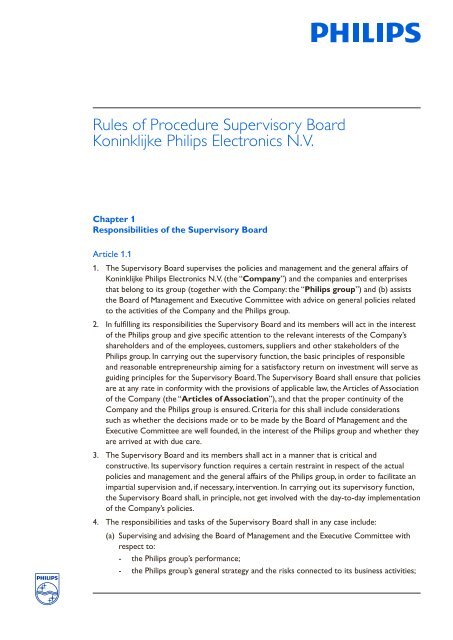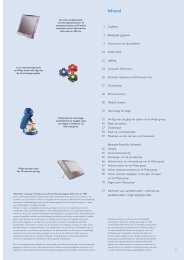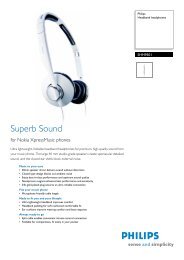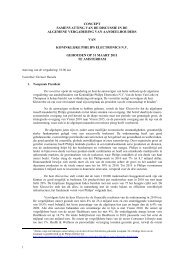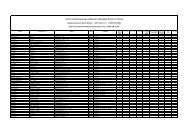Rules of Procedure Supervisory Board - Philips
Rules of Procedure Supervisory Board - Philips
Rules of Procedure Supervisory Board - Philips
Create successful ePaper yourself
Turn your PDF publications into a flip-book with our unique Google optimized e-Paper software.
<strong>Rules</strong> <strong>of</strong> <strong>Procedure</strong> <strong>Supervisory</strong> <strong>Board</strong><br />
Koninklijke <strong>Philips</strong> Electronics N.V.<br />
Chapter 1<br />
Responsibilities <strong>of</strong> the <strong>Supervisory</strong> <strong>Board</strong><br />
Article 1.1<br />
1. The <strong>Supervisory</strong> <strong>Board</strong> supervises the policies and management and the general affairs <strong>of</strong><br />
Koninklijke <strong>Philips</strong> Electronics N.V. (the “Company”) and the companies and enterprises<br />
that belong to its group (together with the Company: the “<strong>Philips</strong> group”) and (b) assists<br />
the <strong>Board</strong> <strong>of</strong> Management and Executive Committee with advice on general policies related<br />
to the activities <strong>of</strong> the Company and the <strong>Philips</strong> group.<br />
2. In fulfilling its responsibilities the <strong>Supervisory</strong> <strong>Board</strong> and its members will act in the interest<br />
<strong>of</strong> the <strong>Philips</strong> group and give specific attention to the relevant interests <strong>of</strong> the Company’s<br />
shareholders and <strong>of</strong> the employees, customers, suppliers and other stakeholders <strong>of</strong> the<br />
<strong>Philips</strong> group. In carrying out the supervisory function, the basic principles <strong>of</strong> responsible<br />
and reasonable entrepreneurship aiming for a satisfactory return on investment will serve as<br />
guiding principles for the <strong>Supervisory</strong> <strong>Board</strong>. The <strong>Supervisory</strong> <strong>Board</strong> shall ensure that policies<br />
are at any rate in conformity with the provisions <strong>of</strong> applicable law, the Articles <strong>of</strong> Association<br />
<strong>of</strong> the Company (the “Articles <strong>of</strong> Association”), and that the proper continuity <strong>of</strong> the<br />
Company and the <strong>Philips</strong> group is ensured. Criteria for this shall include considerations<br />
such as whether the decisions made or to be made by the <strong>Board</strong> <strong>of</strong> Management and the<br />
Executive Committee are well founded, in the interest <strong>of</strong> the <strong>Philips</strong> group and whether they<br />
are arrived at with due care.<br />
3. The <strong>Supervisory</strong> <strong>Board</strong> and its members shall act in a manner that is critical and<br />
constructive. Its supervisory function requires a certain restraint in respect <strong>of</strong> the actual<br />
policies and management and the general affairs <strong>of</strong> the <strong>Philips</strong> group, in order to facilitate an<br />
impartial supervision and, if necessary, intervention. In carrying out its supervisory function,<br />
the <strong>Supervisory</strong> <strong>Board</strong> shall, in principle, not get involved with the day-to-day implementation<br />
<strong>of</strong> the Company’s policies.<br />
4. The responsibilities and tasks <strong>of</strong> the <strong>Supervisory</strong> <strong>Board</strong> shall in any case include:<br />
(a) Supervising and advising the <strong>Board</strong> <strong>of</strong> Management and the Executive Committee with<br />
respect to:<br />
- the <strong>Philips</strong> group’s performance;<br />
- the <strong>Philips</strong> group’s general strategy and the risks connected to its business activities;
<strong>Rules</strong> <strong>of</strong> <strong>Procedure</strong> <strong>Supervisory</strong> <strong>Board</strong><br />
- the operational and financial objectives;<br />
- the parameters to be approved in relation to the strategy;<br />
- corporate social responsibility issues;<br />
- the structure and management <strong>of</strong> the systems <strong>of</strong> internal business controls;<br />
- the financial reporting process;<br />
- the compliance with applicable laws and regulations; and<br />
- the company-shareholders relationship;<br />
(b) Supervising and advising the <strong>Board</strong> <strong>of</strong> Management and the Executive Committee with<br />
respect to the corporate governance structure <strong>of</strong> the Company;<br />
(c) Approving the annual accounts <strong>of</strong> the Company;<br />
(d) Approving the <strong>Philips</strong> group’s annual budget and significant capital expenditures <strong>of</strong> the<br />
<strong>Philips</strong> group;<br />
(e) Reviewing and approving any resolutions <strong>of</strong> the <strong>Board</strong> <strong>of</strong> Management concerning the<br />
matters referred to in Article 15 <strong>of</strong> the Articles <strong>of</strong> Association;<br />
(f) Selecting and recommending the appointment <strong>of</strong> members <strong>of</strong> the <strong>Board</strong> <strong>of</strong> Management,<br />
proposing the remuneration policy for members <strong>of</strong> the <strong>Board</strong> <strong>of</strong> Management for<br />
adoption by the General Meeting <strong>of</strong> Shareholders <strong>of</strong> the Company and establishing the<br />
remuneration and the employment terms for the individual members <strong>of</strong> the <strong>Board</strong> <strong>of</strong><br />
Management in conformity with such remuneration policy;<br />
(g) Reviewing and approving the appointment <strong>of</strong> members <strong>of</strong> the Executive Committee<br />
(other than members <strong>of</strong> the <strong>Board</strong> <strong>of</strong> Management);<br />
(h) Selecting and recommending the appointment <strong>of</strong> members <strong>of</strong> the <strong>Supervisory</strong> <strong>Board</strong> and<br />
proposing the remuneration policy for members <strong>of</strong> the <strong>Supervisory</strong> <strong>Board</strong>;<br />
(i) Reviewing the functioning <strong>of</strong> the <strong>Supervisory</strong> <strong>Board</strong>, its committees, and its individual<br />
members and the conclusions that must be drawn on the basis there<strong>of</strong> at least on an<br />
annual basis;<br />
(j) Reviewing the functioning <strong>of</strong> the <strong>Board</strong> <strong>of</strong> Management and its individual members and<br />
the conclusions that must be drawn on the basis there<strong>of</strong> at least on an annual basis;<br />
(k) Selecting and recommending the appointment <strong>of</strong> the Company’s External Auditor;<br />
(l) Approving the appointment <strong>of</strong> a member <strong>of</strong> the <strong>Board</strong> <strong>of</strong> Management and the Executive<br />
Committee as member <strong>of</strong> the supervisory board or in a similar position at a company;<br />
and<br />
(m) Recommending and approving the appointment and dismissal by the <strong>Board</strong> <strong>of</strong><br />
Management <strong>of</strong> the General Secretary <strong>of</strong> the Company.<br />
5. The <strong>Supervisory</strong> <strong>Board</strong> shall prepare and publish a report that shall be included in the<br />
Company’s annual report over such year.The report shall relate to the functioning and<br />
activities <strong>of</strong> the <strong>Supervisory</strong> <strong>Board</strong> during that financial year.<br />
6. The <strong>Board</strong> <strong>of</strong> Management and the Executive Committee shall provide the <strong>Supervisory</strong><br />
<strong>Board</strong> and its committees in due time with such information as the <strong>Supervisory</strong> <strong>Board</strong> and<br />
its committees need for the performance <strong>of</strong> their duties and shall regularly report to the<br />
<strong>Supervisory</strong> <strong>Board</strong> on the course <strong>of</strong> business <strong>of</strong> the <strong>Philips</strong> group. The <strong>Supervisory</strong> <strong>Board</strong><br />
and its individual members each shall have an own responsibility for obtaining all (additional)<br />
information from the <strong>Board</strong> <strong>of</strong> Management and the Executive Committee and the External<br />
Auditor necessary for the due performance <strong>of</strong> its supervisory duties. If the <strong>Supervisory</strong><br />
<strong>Board</strong>, or its committees after having informed the Chairman <strong>of</strong> the <strong>Supervisory</strong> <strong>Board</strong><br />
and the President/CEO <strong>of</strong> the Company, determine it necessary or advisable, it may also<br />
2
<strong>Rules</strong> <strong>of</strong> <strong>Procedure</strong> <strong>Supervisory</strong> <strong>Board</strong><br />
obtain information from <strong>of</strong>ficers, employees and (external) advisors <strong>of</strong> the <strong>Philips</strong> group and<br />
can it engage its own internal and external experts and advisors (subject to appropriate<br />
confidentiality requirements imposed on such experts and advisors).The Company will make<br />
the necessary resources available to do so. The <strong>Supervisory</strong> <strong>Board</strong> may inspect all corporate<br />
records, interview all <strong>of</strong>ficers and employees <strong>of</strong> the <strong>Philips</strong> group as it deems necessary to<br />
fulfil its duties.<br />
Responsibilities <strong>of</strong> the Chairman, Vice-Chairman and Secretary <strong>of</strong> the<br />
<strong>Supervisory</strong> <strong>Board</strong> and <strong>of</strong> the General Secretary <strong>of</strong> the Company<br />
Article 1.2<br />
1. The Chairman, Vice-Chairman and the Secretary <strong>of</strong> the <strong>Supervisory</strong> <strong>Board</strong> shall be appointed<br />
by the <strong>Supervisory</strong> <strong>Board</strong> from among its members. The Chairman shall be independent in<br />
the sense <strong>of</strong> the applicable US Securities Regulations and the Dutch Corporate Governance<br />
Code.<br />
2. Meetings <strong>of</strong> the <strong>Supervisory</strong> <strong>Board</strong> shall be chaired by its Chairman and in his absence by the<br />
Vice-Chairman. If both the Chairman and the Vice-Chairman are not present at a meeting<br />
the most senior member will act as chairman.<br />
3. The Chairman ensures that the <strong>Supervisory</strong> <strong>Board</strong> and its committees function properly in<br />
all respects and comply with the rules as set forth herein. He shall in principle be available<br />
at all times for consultation by the other <strong>Supervisory</strong> <strong>Board</strong> members and the <strong>Board</strong> <strong>of</strong><br />
Management. The Chairman shall remain in close and frequent contact with the President/<br />
CEO and if and when required with the other members <strong>of</strong> the <strong>Board</strong> <strong>of</strong> Management and<br />
the Executive Committee and shall keep the <strong>Supervisory</strong> <strong>Board</strong> informed <strong>of</strong> these contacts<br />
regularly.<br />
4. The Chairman and the Secretary will monitor the information to be submitted by or on<br />
behalf <strong>of</strong> the <strong>Board</strong> <strong>of</strong> Management and the Executive Committee to the <strong>Supervisory</strong> <strong>Board</strong><br />
and request such other information as they deem appropriate.<br />
5. The Vice-Chairman shall deputise for the Chairman when the occasion arises. With reference<br />
to article 1.5, paragraph 2, the Vice-Chairman shall act as contact <strong>of</strong> individual members<br />
<strong>of</strong> the <strong>Supervisory</strong> <strong>Board</strong> or the <strong>Board</strong> <strong>of</strong> Management concerning the functioning <strong>of</strong> the<br />
Chairman <strong>of</strong> the <strong>Supervisory</strong> <strong>Board</strong>.<br />
6. The <strong>Supervisory</strong> <strong>Board</strong> shall be supported by the General Secretary <strong>of</strong> the Company. The<br />
General Secretary sees to it that correct procedures are followed and that the <strong>Supervisory</strong><br />
<strong>Board</strong> shall act in accordance with its obligations under applicable law, regulations and<br />
the Articles <strong>of</strong> Association. The General Secretary will assist the Chairman in the actual<br />
organization <strong>of</strong> the affairs <strong>of</strong> the <strong>Supervisory</strong> <strong>Board</strong> - such in respect <strong>of</strong> information, agenda,<br />
evaluation, training program - and is the contact person for interested parties who want to<br />
make concerns known to the <strong>Supervisory</strong> <strong>Board</strong>. The General Secretary shall, either on the<br />
recommendation <strong>of</strong> the <strong>Supervisory</strong> <strong>Board</strong> or otherwise, be appointed and dismissed by the<br />
<strong>Board</strong> <strong>of</strong> Management, after the approval <strong>of</strong> the <strong>Supervisory</strong> <strong>Board</strong> has been obtained.<br />
3
<strong>Rules</strong> <strong>of</strong> <strong>Procedure</strong> <strong>Supervisory</strong> <strong>Board</strong><br />
Committees <strong>of</strong> the <strong>Supervisory</strong> <strong>Board</strong><br />
Article 1.3<br />
1. The <strong>Supervisory</strong> <strong>Board</strong>, though remaining responsible, may assign certain tasks to one or<br />
more permanent and/or ad hoc committees formed from among its members. The function<br />
<strong>of</strong> such committees is to prepare the decision-making <strong>of</strong> the <strong>Supervisory</strong> <strong>Board</strong> and such<br />
committees have no independent or assigned powers unless and to the extent explicitly<br />
assigned by these <strong>Rules</strong> <strong>of</strong> <strong>Procedure</strong> or by the <strong>Supervisory</strong> <strong>Board</strong>. The committees, on a<br />
regular basis, report on their actions, reviews, proposals, and findings to the <strong>Supervisory</strong><br />
<strong>Board</strong>.<br />
2. The members <strong>of</strong> such committees will be appointed by the <strong>Supervisory</strong> <strong>Board</strong>, which will<br />
also appoint the committee’s chairman and secretary, who does not need to be a member <strong>of</strong><br />
the <strong>Supervisory</strong> <strong>Board</strong>, and establish the form and frequency <strong>of</strong> reporting to the <strong>Supervisory</strong><br />
<strong>Board</strong>.<br />
3. Three permanent committees will assist the <strong>Supervisory</strong> <strong>Board</strong>: a Corporate Governance<br />
and Nomination & Selection Committee, an Audit Committee and a Remuneration<br />
Committee. The charters <strong>of</strong> these committees are set out below in Chapters 2, 3 and 4.<br />
Meetings <strong>of</strong> the <strong>Supervisory</strong> <strong>Board</strong><br />
Article 1.4<br />
1. The <strong>Supervisory</strong> <strong>Board</strong> shall meet at least 6 times per year. The schedule for its meetings<br />
in the next year will be adopted each year at the latest in the last meeting <strong>of</strong> the preceding<br />
year. One meeting will be scheduled to approve the annual accounts to be submitted to the<br />
General Meeting <strong>of</strong> Shareholders.<br />
2. Meetings <strong>of</strong> the <strong>Supervisory</strong> <strong>Board</strong> will be called in writing by or on behalf <strong>of</strong> the Chairman<br />
<strong>of</strong> the <strong>Supervisory</strong> <strong>Board</strong> or in his absence or inability by the Vice-Chairman. The invitation<br />
to meetings will contain the agenda. Every member can suggest items for the agenda. The<br />
agenda and accompanying materials for the meeting will be sent to the members in good<br />
time before any meeting.<br />
3. Meetings <strong>of</strong> the <strong>Supervisory</strong> <strong>Board</strong> and its committees may be held, and members <strong>of</strong> the<br />
<strong>Supervisory</strong> <strong>Board</strong> may participate in meetings, by telephone or videoconference.<br />
4. Unless the <strong>Supervisory</strong> <strong>Board</strong> decides otherwise, the meetings <strong>of</strong> the <strong>Supervisory</strong> <strong>Board</strong><br />
shall be attended by the President/CEO and, if practically possible, by the other members<br />
<strong>of</strong> the <strong>Board</strong> <strong>of</strong> Management and the Executive Committee except for the (parts <strong>of</strong> the)<br />
meeting during which the issues referred to in article 1.5, paragraph 2 here<strong>of</strong> are discussed.<br />
In case a conflict <strong>of</strong> interest concerning a member <strong>of</strong> the <strong>Supervisory</strong> <strong>Board</strong> or the <strong>Board</strong><br />
<strong>of</strong> Management or the Executive Committee is discussed, the relevant member shall not be<br />
present during such discussions. The External Auditor <strong>of</strong> the Company shall attend the (part<br />
<strong>of</strong> the) meetings <strong>of</strong> the <strong>Supervisory</strong> <strong>Board</strong> in which the annual accounts <strong>of</strong> the Company are<br />
discussed and approved.<br />
5. The <strong>Supervisory</strong> <strong>Board</strong> and/or its Chairman may request <strong>of</strong>ficers or external advisors <strong>of</strong> the<br />
<strong>Philips</strong> group to be present at a meeting <strong>of</strong> the <strong>Supervisory</strong> <strong>Board</strong>.<br />
6. If a member <strong>of</strong> the <strong>Supervisory</strong> <strong>Board</strong> is frequently absent during meetings <strong>of</strong> the<br />
<strong>Supervisory</strong> <strong>Board</strong>, the Chairman will discuss this with such member.<br />
4
<strong>Rules</strong> <strong>of</strong> <strong>Procedure</strong> <strong>Supervisory</strong> <strong>Board</strong><br />
7. The minutes <strong>of</strong> the meetings <strong>of</strong> the <strong>Supervisory</strong> <strong>Board</strong> shall be prepared under the<br />
responsibility <strong>of</strong> the General Secretary or any other person designated by the Chairman. The<br />
minutes shall be signed for adoption by the Chairman and the Secretary <strong>of</strong> the <strong>Supervisory</strong><br />
<strong>Board</strong>.<br />
Items to be discussed in the <strong>Supervisory</strong> <strong>Board</strong> (mandatory)<br />
Article 1.5<br />
1. At least once a year the <strong>Supervisory</strong> <strong>Board</strong> - on the basis <strong>of</strong> a written report <strong>of</strong> the <strong>Board</strong><br />
<strong>of</strong> Management and the Executive Committee - will discuss the general strategy <strong>of</strong> the<br />
Company and the <strong>Philips</strong> group, as well as the main risks associated with their business<br />
activities, and the results <strong>of</strong> the assessment by the <strong>Board</strong> <strong>of</strong> Management and the Executive<br />
Committee <strong>of</strong> the structure and operation <strong>of</strong> the systems <strong>of</strong> internal business controls and<br />
any significant changes therein.The Audit Committee <strong>of</strong> the <strong>Supervisory</strong> <strong>Board</strong> will advise<br />
the <strong>Supervisory</strong> <strong>Board</strong> on these issues.<br />
2. At least once a year the <strong>Supervisory</strong> <strong>Board</strong> shall discuss - without the <strong>Board</strong> <strong>of</strong> Management<br />
and the Executive Committee being present - (a) its own (and its individual members’)<br />
functioning, (b) the pr<strong>of</strong>ile and composition <strong>of</strong> the <strong>Supervisory</strong> <strong>Board</strong>, (c) its relationship<br />
with the <strong>Board</strong> <strong>of</strong> Management and the Executive Committee, (d) the composition and the<br />
functioning <strong>of</strong> the <strong>Board</strong> <strong>of</strong> Management and the Executive Committee and their individual<br />
members, (e) the succession <strong>of</strong> members <strong>of</strong> the <strong>Board</strong> <strong>of</strong> Management and the Executive<br />
Committee and (f) the remuneration <strong>of</strong> members <strong>of</strong> the <strong>Board</strong> <strong>of</strong> Management and the<br />
Executive Committee.<br />
3. The <strong>Supervisory</strong> <strong>Board</strong> in consultation with the <strong>Board</strong> <strong>of</strong> Management and the Executive<br />
Committee will resolve to put on the agenda <strong>of</strong> the General Meeting <strong>of</strong> Shareholders any<br />
proposal from shareholder(s), made in accordance with article 25, paragraph 3 <strong>of</strong> the Articles<br />
<strong>of</strong> Association, unless substantive Company concerns prevail.<br />
Resolutions <strong>of</strong> the <strong>Supervisory</strong> <strong>Board</strong><br />
Article 1.6<br />
1. Resolutions <strong>of</strong> the <strong>Supervisory</strong> <strong>Board</strong> are taken by majority vote. Resolutions can only be<br />
taken if at least one third <strong>of</strong> the members is present, with the proviso that members who<br />
have a conflict <strong>of</strong> interests as referred to in article 1.10 shall not be taken into account when<br />
calculating this quorum, and the item has been put on the agenda previously circulated. If all<br />
members are present and agree hereto the <strong>Supervisory</strong> <strong>Board</strong> may resolve on issues not on<br />
the agenda.<br />
2. Upon a proposal by or on behalf <strong>of</strong> the Chairman, resolutions <strong>of</strong> the <strong>Supervisory</strong> <strong>Board</strong> can<br />
also be taken in writing if (a) a proposal for such resolution has been sent to all members<br />
prior to the meeting, (b) no one member has objected to taking such resolution in writing<br />
and (c) more than half <strong>of</strong> the members have voted in favour <strong>of</strong> the proposed resolution. In<br />
such case the resolution <strong>of</strong> the <strong>Supervisory</strong> <strong>Board</strong> will be recorded in writing and signed by<br />
the Chairman and the Secretary.<br />
3. A declaration signed by two members <strong>of</strong> the <strong>Supervisory</strong> <strong>Board</strong> that a resolution has been<br />
adopted serves as evidence to third parties <strong>of</strong> that resolution.<br />
5
<strong>Rules</strong> <strong>of</strong> <strong>Procedure</strong> <strong>Supervisory</strong> <strong>Board</strong><br />
Period <strong>of</strong> appointment and re-election<br />
Article 1.7<br />
1. Members <strong>of</strong> the <strong>Supervisory</strong> <strong>Board</strong> shall be appointed for a period <strong>of</strong> four years and resign<br />
at the first General Meeting <strong>of</strong> Shareholders after such period has elapsed.Thereafter<br />
members may be re-elected twice for a period <strong>of</strong> four years, unless the <strong>Supervisory</strong> <strong>Board</strong><br />
resolves to deviate from this provision in specific cases.<br />
2. The members <strong>of</strong> the <strong>Supervisory</strong> <strong>Board</strong> shall resign in accordance with a rotation plan<br />
established by the <strong>Supervisory</strong> <strong>Board</strong>.<br />
3. Resolutions to nominate a member for re-election to the <strong>Supervisory</strong> <strong>Board</strong> will be dealt<br />
with in the same manner and with the same degree <strong>of</strong> diligence as resolutions to nominate a<br />
person for election to the <strong>Supervisory</strong> <strong>Board</strong> for the first time.<br />
4. A member <strong>of</strong> the <strong>Supervisory</strong> <strong>Board</strong> will step down in the event <strong>of</strong> inadequate functioning,<br />
structural conflicts, structural conflicts <strong>of</strong> interest, any other compelling reason or when this<br />
it otherwise deemed necessary at the discretion <strong>of</strong> the <strong>Supervisory</strong> <strong>Board</strong>.<br />
5. Members <strong>of</strong> the <strong>Supervisory</strong> <strong>Board</strong> who temporarily take on the management <strong>of</strong> the<br />
Company in the event (a) member(s) <strong>of</strong> the <strong>Board</strong> <strong>of</strong> Management is (are) absent or<br />
unable to perform its (their) duties shall resign as a member <strong>of</strong> the <strong>Supervisory</strong> <strong>Board</strong> or<br />
temporarily suspend their activities as member <strong>of</strong> the <strong>Supervisory</strong> <strong>Board</strong> for the period that<br />
they are performing such management duties.<br />
6. Each member <strong>of</strong> the <strong>Supervisory</strong> <strong>Board</strong> shall follow after his appointment an introduction<br />
programme, in which attention shall be paid to: (a) the general financial and legal affairs <strong>of</strong><br />
the <strong>Philips</strong> group, (b) the financial reporting by the <strong>Philips</strong> group, (c) specific aspects unique<br />
to the <strong>Philips</strong> group and its business activities and (d) the responsibilities <strong>of</strong> members <strong>of</strong><br />
the <strong>Supervisory</strong> <strong>Board</strong>. The <strong>Supervisory</strong> <strong>Board</strong> will review each year on which aspects<br />
further training and education <strong>of</strong> the <strong>Supervisory</strong> <strong>Board</strong> is required on the basis <strong>of</strong> an annual<br />
evaluation.<br />
Composition and “Pr<strong>of</strong>ile” <strong>of</strong> the <strong>Supervisory</strong> <strong>Board</strong><br />
Article 1.8<br />
1. The <strong>Supervisory</strong> <strong>Board</strong> will exercise its powers to recommend persons for election to the<br />
<strong>Supervisory</strong> <strong>Board</strong> in such a way that the <strong>Supervisory</strong> <strong>Board</strong> and its members can fulfil their<br />
supervisory and advisory tasks in an independent and critical way.<br />
2. The <strong>Supervisory</strong> <strong>Board</strong>’s composition follows the pr<strong>of</strong>ile, which aims for an appropriate<br />
combination <strong>of</strong> knowledge and experience among its members encompassing marketing,<br />
manufacturing, technology, financial, economic, social and legal aspects <strong>of</strong> international<br />
business and government and public administration in relation to the global and multiproduct<br />
character <strong>of</strong> <strong>Philips</strong>’ businesses.The <strong>Supervisory</strong> <strong>Board</strong> pays great value to diversity in<br />
its composition. More particular it aims for having members with a European and a non-<br />
European background (nationality, working experience or otherwise), one or more female<br />
members and one or more members with an executive or similar position in business or<br />
society no longer than 5 years ago.<br />
All members <strong>of</strong> the <strong>Supervisory</strong> <strong>Board</strong>, with the exception <strong>of</strong> not more than one person,<br />
shall be independent within the meaning <strong>of</strong> the Dutch Corporate Governance Code. Each<br />
member <strong>of</strong> the <strong>Supervisory</strong> <strong>Board</strong> shall be capable <strong>of</strong> assessing the broad outline <strong>of</strong> the<br />
6
<strong>Rules</strong> <strong>of</strong> <strong>Procedure</strong> <strong>Supervisory</strong> <strong>Board</strong><br />
overall policy <strong>of</strong> the Company.<br />
The pr<strong>of</strong>ile <strong>of</strong> the <strong>Supervisory</strong> <strong>Board</strong> will be made public through publication in the<br />
Company’s annual reports or on the Company’s website.<br />
3. The <strong>Supervisory</strong> <strong>Board</strong> will recommend such persons for election to the <strong>Supervisory</strong> <strong>Board</strong><br />
as necessary to ensure that the combined composition <strong>of</strong> the <strong>Supervisory</strong> <strong>Board</strong> will match<br />
the pr<strong>of</strong>ile for the <strong>Supervisory</strong> <strong>Board</strong> and that the <strong>Supervisory</strong> <strong>Board</strong> and its members will<br />
be able to fulfil their supervisory and advisory tasks in an independent and critical way from<br />
one another, the <strong>Board</strong> <strong>of</strong> Management and the Executive Committee and any particular<br />
interest and carry out their responsibilities in a proper manner.<br />
4. The <strong>Supervisory</strong> <strong>Board</strong>, in exercising its powers to nominate persons for appointment to<br />
the <strong>Supervisory</strong> <strong>Board</strong> or the <strong>Board</strong> <strong>of</strong> Management, will take care, having due regard to<br />
article 1.1, paragraph 2, that nominees will have the confidence <strong>of</strong> the General Meeting <strong>of</strong><br />
Shareholders.<br />
5. Members <strong>of</strong> the <strong>Supervisory</strong> <strong>Board</strong> shall not hold in total more than five supervisory board<br />
memberships (including non-executive board memberships) <strong>of</strong> Dutch listed companies,<br />
the chairmanship <strong>of</strong> a supervisory board counting double. In taking up other positions or<br />
interests other than those disclosed at the time <strong>of</strong> election, members inform the Chairman<br />
and ensure that they will remain able to fulfil their tasks as a member <strong>of</strong> the <strong>Supervisory</strong><br />
<strong>Board</strong> or its committees.<br />
6. The <strong>Supervisory</strong> <strong>Board</strong> may appoint one <strong>of</strong> its members as Delegate Member in accordance<br />
with Article 20 <strong>of</strong> the Articles <strong>of</strong> Association.A Delegated Member shall be assigned with a<br />
special task. Its delegated authority may not exceed the authority or tasks <strong>of</strong> the <strong>Supervisory</strong><br />
<strong>Board</strong> itself and does not include the task <strong>of</strong> managing the Company. The delegation relates<br />
to a more intensive supervising and advising role <strong>of</strong> and more frequent consultation with<br />
the <strong>Board</strong> <strong>of</strong> Management and the Executive Committee with regard to the general affairs<br />
<strong>of</strong> the Company by the delegated <strong>Supervisory</strong> <strong>Board</strong> member. The delegation shall be for a<br />
temporary period only and the term <strong>of</strong> the delegation shall be stated in a resolution <strong>of</strong> the<br />
<strong>Supervisory</strong> <strong>Board</strong>. The delegated <strong>Supervisory</strong> <strong>Board</strong> member shall remain a member <strong>of</strong> the<br />
<strong>Supervisory</strong> <strong>Board</strong>.<br />
Article 1.9<br />
1. Should any <strong>Supervisory</strong> <strong>Board</strong> member hold shares in the share capital <strong>of</strong> the Company, this<br />
will be for the purpose <strong>of</strong> long-term investment; members <strong>of</strong> the <strong>Supervisory</strong> <strong>Board</strong> will<br />
refrain from short-term transactions in <strong>Philips</strong> securities1. 2. With respect to <strong>Philips</strong> securities, members <strong>of</strong> the <strong>Supervisory</strong> <strong>Board</strong> are bound to the<br />
<strong>Philips</strong>’ <strong>Rules</strong> <strong>of</strong> Conduct with respect to Inside Information and must at all times comply<br />
with all applicable laws and regulations, including applicable notification requirements,<br />
applicable to the ownership <strong>of</strong> and transactions related to <strong>Philips</strong> securities.<br />
3. With respect to the ownership <strong>of</strong> and transactions with securities other than regulated<br />
by the <strong>Philips</strong>’ <strong>Rules</strong> <strong>of</strong> Conduct with respect to Inside Information, members <strong>of</strong> the<br />
<strong>Supervisory</strong> <strong>Board</strong> must at all times comply with all applicable laws and regulations, including<br />
applicable notification requirements.<br />
1 For the purpose <strong>of</strong> article 1.9 securities are amongst others shares, bonds, convertible bonds, options, warrants and other<br />
derivative securities, share swaps and similar agreements, securities whose value is determined in whole or in part (e.g.<br />
more than 10%) by the value <strong>of</strong> securities before mentioned, and with regard to <strong>Philips</strong> securities also convertible personnel<br />
debentures, employee stock options and restricted share rights.<br />
7
<strong>Rules</strong> <strong>of</strong> <strong>Procedure</strong> <strong>Supervisory</strong> <strong>Board</strong><br />
4. With respect to transactions (with the exception <strong>of</strong> any acquisition <strong>of</strong> securities issued by<br />
way <strong>of</strong> a stockdividend) related to securities in any <strong>of</strong> the companies belonging to the peer<br />
group <strong>of</strong> leading multinational electronics/electrical equipment companies as determined<br />
by the <strong>Supervisory</strong> <strong>Board</strong> and published in the Company’s annual report, members <strong>of</strong><br />
the <strong>Supervisory</strong> <strong>Board</strong> are prohibited from trading, directly or indirectly, during Blocked<br />
Periods - according to and as defined in the <strong>Philips</strong>’ <strong>Rules</strong> <strong>of</strong> Conduct with respect to Inside<br />
Information - preceding the disclosure <strong>of</strong> <strong>Philips</strong>’ annual or quarterly figures. However the<br />
prohibition referred to in the previous sentence does not apply if the relevant member<br />
<strong>of</strong> the <strong>Supervisory</strong> <strong>Board</strong> has transferred the discretionary management <strong>of</strong> his securities<br />
portfolio to an independent third party by means <strong>of</strong> a written mandate agreement.<br />
5. Members <strong>of</strong> the <strong>Supervisory</strong> <strong>Board</strong>, as well as <strong>of</strong> its committees, will receive a remuneration<br />
to be determined by the General Meeting <strong>of</strong> Shareholders in accordance with the Articles <strong>of</strong><br />
Association. Travel and other expenses will be reimbursed separately.<br />
6. Each member <strong>of</strong> the <strong>Supervisory</strong> <strong>Board</strong> shall provide such information to the Company as is<br />
necessary to enable the Company to comply with applicable laws and regulations (including<br />
the rules <strong>of</strong> any stock exchanges on which the Company may be listed).<br />
Conflicts <strong>of</strong> interests<br />
Article 1.10<br />
1. In the event <strong>of</strong> a legal act or a lawsuit between the Company and:<br />
(a) a member <strong>of</strong> the <strong>Supervisory</strong> <strong>Board</strong> him/herself; or<br />
(b) the spouse, registered partner or other life companion, foster child and relatives by<br />
blood or marriage up to the second degree <strong>of</strong> the member <strong>of</strong> a <strong>Supervisory</strong> <strong>Board</strong>; or<br />
(c) another legal entity, though not a company belonging to the <strong>Philips</strong> group or participating<br />
interest <strong>of</strong> the Company, in which a member <strong>of</strong> the <strong>Supervisory</strong> <strong>Board</strong> is an executive or<br />
non-executive board member; or<br />
(d) another legal entity, though not a company belonging to the <strong>Philips</strong> group or participating<br />
interest <strong>of</strong> the Company, <strong>of</strong> which an executive board member has a relationship under<br />
family law, as referred to above, with a member <strong>of</strong> the <strong>Supervisory</strong> <strong>Board</strong>; or<br />
(e) another company with share capital in which a member <strong>of</strong> the <strong>Supervisory</strong> <strong>Board</strong> has an<br />
interest that is greater than 5% <strong>of</strong> the issued capital; or<br />
(f) a partnership in which a member <strong>of</strong> the <strong>Supervisory</strong> <strong>Board</strong> is a partner, and ins<strong>of</strong>ar as<br />
the legal act is <strong>of</strong> material significance to the Company and/or to the respective member<br />
<strong>of</strong> the <strong>Supervisory</strong> <strong>Board</strong>,<br />
the respective member <strong>of</strong> the <strong>Supervisory</strong> <strong>Board</strong> shall not take part in the decision-making<br />
in respect <strong>of</strong> the legal act or the lawsuit. Resolutions in respect <strong>of</strong> such legal act or lawsuit<br />
must be approved by the <strong>Supervisory</strong> <strong>Board</strong>.<br />
2. Unless the rules <strong>of</strong> article 1.10, paragraph 1 are complied with, each member <strong>of</strong> the<br />
<strong>Supervisory</strong> <strong>Board</strong> (other than the Chairman <strong>of</strong> the <strong>Supervisory</strong> <strong>Board</strong>) shall immediately<br />
report in respect <strong>of</strong> a decision any conflict or potential conflict that is <strong>of</strong> a material<br />
significance to the Company and/or to such member <strong>of</strong> the <strong>Supervisory</strong> <strong>Board</strong> to the<br />
Chairman <strong>of</strong> the <strong>Supervisory</strong> <strong>Board</strong>. The member <strong>of</strong> the <strong>Supervisory</strong> <strong>Board</strong> with such<br />
conflict <strong>of</strong> interests must provide the Chairman with all information relevant to the conflict<br />
<strong>of</strong> interests, including information concerning the spouse, registered partner or other life<br />
companion, foster child and relatives by blood or marriage up to the second degree <strong>of</strong> the<br />
8
<strong>Rules</strong> <strong>of</strong> <strong>Procedure</strong> <strong>Supervisory</strong> <strong>Board</strong><br />
member <strong>of</strong> the <strong>Supervisory</strong> <strong>Board</strong>.<br />
The Chairman will determine whether a reported conflict <strong>of</strong> interests qualifies as a conflict<br />
<strong>of</strong> interests to which article 1.10, paragraph 1 applies or to which article 1.10, paragraph 1<br />
should be applied in a similar way in respect <strong>of</strong> the decisionmaking.<br />
Unless the rules <strong>of</strong> article 1.10, paragraph 1 are complied with, the Chairman shall<br />
immediately report in respect <strong>of</strong> a decision any conflict or potential conflict that is <strong>of</strong> a<br />
material significance to the Company and/or to him, to the Vice-Chairman <strong>of</strong> the <strong>Supervisory</strong><br />
<strong>Board</strong>. The Chairman must provide the Vice-Chairman <strong>of</strong> the <strong>Supervisory</strong> <strong>Board</strong> with all<br />
information relevant to the conflict <strong>of</strong> interests, including information concerning the spouse,<br />
registered partner or other life companion, foster child and relatives by blood or marriage<br />
up to the second degree <strong>of</strong> the Chairman.<br />
The <strong>Supervisory</strong> <strong>Board</strong> will determine whether a reported conflict <strong>of</strong> interests qualifies as a<br />
conflict <strong>of</strong> interests to which article 1.10, paragraph 1 applies.<br />
3. Legal acts to which article 1.10, paragraph 1 applies shall be mentioned in the Company’s<br />
annual report for the financial year in question.<br />
4. All legal acts in respect <strong>of</strong> which a member <strong>of</strong> the <strong>Supervisory</strong> <strong>Board</strong> has a conflict <strong>of</strong><br />
interests shall be agreed on terms that are customary in the sector concerned.<br />
Status and contents <strong>of</strong> the <strong>Rules</strong> <strong>of</strong> <strong>Procedure</strong><br />
Article 1.11<br />
These <strong>Rules</strong> <strong>of</strong> <strong>Procedure</strong> are complementary to the rules and regulations (from time to time)<br />
applicable to the <strong>Supervisory</strong> <strong>Board</strong> under Dutch law or the Articles <strong>of</strong> Association. Where<br />
these <strong>Rules</strong> <strong>of</strong> <strong>Procedure</strong> are inconsistent with Dutch law or the Articles <strong>of</strong> Association, the law<br />
or, as the case may be, the Articles <strong>of</strong> Association shall prevail.<br />
Governing law<br />
Article 1.12<br />
These <strong>Rules</strong> <strong>of</strong> <strong>Procedure</strong> shall be governed by and construed in accordance with the laws <strong>of</strong><br />
the Netherlands.<br />
Chapter 2<br />
Charter <strong>of</strong> the Corporate Governance and Nomination & Selection<br />
Committee<br />
1. The Corporate Governance and Nomination & Selection Committee (the “CGNS<br />
Committee”) shall consist <strong>of</strong> at least two members, including the Chairman and the Vice-<br />
Chairman <strong>of</strong> the <strong>Supervisory</strong> <strong>Board</strong>.<br />
2. The CGNS Committee shall meet at least twice a year. Other meetings may be called by<br />
the chairman <strong>of</strong> the CGNS Committee if deemed necessary or desirable by the CGNS<br />
Committee or its chairman. The agendas and accompanying materials <strong>of</strong> the CGNS<br />
Committee will be circulated to the members <strong>of</strong> the Committee, and the minutes <strong>of</strong><br />
such meetings will be prepared, under the responsibility <strong>of</strong> the secretary <strong>of</strong> the CGNS<br />
Committee or any other person designated by the chairman <strong>of</strong> the CGNS Committee.<br />
9
<strong>Rules</strong> <strong>of</strong> <strong>Procedure</strong> <strong>Supervisory</strong> <strong>Board</strong><br />
3. The specific responsibilities <strong>of</strong> the CGNS Committee shall include:<br />
(a) preparing the selection criteria and appointment procedures for members <strong>of</strong> the<br />
<strong>Supervisory</strong> <strong>Board</strong>, the <strong>Board</strong> <strong>of</strong> Management and (other members <strong>of</strong>) the Executive<br />
Committee;<br />
(b) periodically assessing the size and composition <strong>of</strong> the <strong>Supervisory</strong> <strong>Board</strong> and reviewing<br />
and making recommendations relating to the pr<strong>of</strong>ile for the <strong>Supervisory</strong> <strong>Board</strong>;<br />
(c) periodically assessing the functioning <strong>of</strong> individual members <strong>of</strong> the <strong>Supervisory</strong> <strong>Board</strong><br />
and the <strong>Board</strong> <strong>of</strong> Management and the Executive Committee and reporting the results<br />
there<strong>of</strong> to the <strong>Supervisory</strong> <strong>Board</strong>;<br />
(d) periodically assessing the size and composition <strong>of</strong> the <strong>Board</strong> <strong>of</strong> Management and the<br />
Executive Committee;<br />
(e) making proposals to the <strong>Supervisory</strong> <strong>Board</strong> for the (re)appointment <strong>of</strong> members <strong>of</strong> the<br />
<strong>Supervisory</strong> <strong>Board</strong> and the <strong>Board</strong> <strong>of</strong> Management;<br />
(f) supervising the policy on the selection and appointment <strong>of</strong> senior executives within the<br />
<strong>Philips</strong> group; and<br />
(g) reviewing, at least once a year, and making recommendations to the <strong>Supervisory</strong> <strong>Board</strong><br />
relating to the corporate governance <strong>of</strong> the Company.<br />
4. The CGNS Committee will consult with the President/CEO and, if it so desires, other<br />
members <strong>of</strong> the <strong>Board</strong> <strong>of</strong> Management and the Executive Committee from time to time<br />
on the matters referred to in paragraph 3 above. The CGNS Committee will interview<br />
or have interviewed on its behalf possible candidates. The CGNS Committee will present<br />
its proposal to the <strong>Supervisory</strong> <strong>Board</strong>. In proposing a candidate for nomination to the<br />
<strong>Supervisory</strong> <strong>Board</strong>, the CGNS Committee shall take into consideration article 1.8.<br />
5. The CGNS Committee will review and minute its charter formally on an annual basis<br />
Chapter 3<br />
Charter <strong>of</strong> the Remuneration Committee<br />
1. The Remuneration Committee <strong>of</strong> the <strong>Supervisory</strong> <strong>Board</strong> shall consist <strong>of</strong> at least three<br />
members. Not more than one member <strong>of</strong> the Remuneration Committee shall be an<br />
executive board member <strong>of</strong> a Dutch listed company. The Head <strong>of</strong> Corporate HRM/Global<br />
Reward or any other person as may be designated by the chairman <strong>of</strong> the Remuneration<br />
Committee will act as secretary to the Committee, will circulate the agendas and<br />
accompanying materials for meetings <strong>of</strong> the Remuneration Committee and will prepare the<br />
minutes <strong>of</strong> such meetings.<br />
2. The Remuneration Committee shall meet at least twice a year. Other meetings may be called<br />
by the chairman <strong>of</strong> the Remuneration Committee if deemed necessary or desirable by the<br />
Remuneration Committee or its chairman. The agendas and papers to be discussed in the<br />
meeting <strong>of</strong> the Remuneration Committee will be sent to the members <strong>of</strong> the Remuneration<br />
Committee in good time before the meeting.<br />
3. The specific responsibilities <strong>of</strong> the Remuneration Committee shall include:<br />
(a) reviewing and preparing - after consultation with the President/CEO and the Head <strong>of</strong><br />
Corporate HRM/Global Reward - proposals for the <strong>Supervisory</strong> <strong>Board</strong> concerning the<br />
remuneration policies for the <strong>Board</strong> <strong>of</strong> Management and the Executive Committee;<br />
10
<strong>Rules</strong> <strong>of</strong> <strong>Procedure</strong> <strong>Supervisory</strong> <strong>Board</strong><br />
(b) reviewing and preparing proposals for the <strong>Supervisory</strong> <strong>Board</strong> concerning the individual<br />
remuneration <strong>of</strong> members <strong>of</strong> the <strong>Board</strong> <strong>of</strong> Management;<br />
(c) reviewing and preparing proposals for the <strong>Supervisory</strong> <strong>Board</strong> concerning the corporate<br />
goals and objectives relevant to the annual incentive <strong>of</strong> members <strong>of</strong> the <strong>Board</strong> <strong>of</strong><br />
Management;<br />
(d) reviewing the performance <strong>of</strong> members <strong>of</strong> the <strong>Board</strong> <strong>of</strong> Management and the Executive<br />
Committee in light <strong>of</strong> those corporate goals and objectives and preparing proposals<br />
for the <strong>Supervisory</strong> <strong>Board</strong> on the compensation levels <strong>of</strong> the members <strong>of</strong> the <strong>Board</strong> <strong>of</strong><br />
Management based on such review;<br />
(e) preparing the <strong>Supervisory</strong> <strong>Board</strong>’s report on the remuneration policies for the <strong>Board</strong> <strong>of</strong><br />
Management;<br />
(f) exercising oversight over the development, implementation and administration <strong>of</strong> the<br />
Company’s compensation programs for members <strong>of</strong> the <strong>Board</strong> <strong>of</strong> Management and the<br />
Executive Committee; and<br />
(g) reviewing and preparing proposals for the remuneration <strong>of</strong> the members <strong>of</strong> the<br />
<strong>Supervisory</strong> <strong>Board</strong>.<br />
4. In making any proposals relating to the long-term incentive component <strong>of</strong> the compensation<br />
<strong>of</strong> the members <strong>of</strong> the <strong>Board</strong> <strong>of</strong> Management and the Executive Committee, the<br />
Remuneration Committee shall consider, among other factors, the Company’s performance,<br />
the enhancement <strong>of</strong> the value <strong>of</strong> the <strong>Philips</strong> group and the remuneration package for boardlevel<br />
executives <strong>of</strong> other multinational companies operating in global markets.<br />
5. The President/CEO or the Head <strong>of</strong> Corporate HRM/Global Reward will provide the<br />
Remuneration Committee with all the information necessary to make a well-considered<br />
judgement on the remuneration <strong>of</strong> members <strong>of</strong> the <strong>Board</strong> <strong>of</strong> Management and the Executive<br />
Committee.<br />
6. If the Remuneration Committee makes use <strong>of</strong> the services <strong>of</strong> an external remuneration<br />
consultant in carrying out its duties, it shall verify that the consultant concerned does not<br />
provide advice to the <strong>Board</strong> <strong>of</strong> Management.<br />
7. The Remuneration Committee has – at any time – the right to seek advice from internal and<br />
external experts and advisors on all kind <strong>of</strong> remuneration matters.<br />
8. The Remuneration Committee will review and minute its charter formally on an annual basis.<br />
Chapter 4<br />
Charter <strong>of</strong> the Audit Committee<br />
Composition, meetings and working procedures <strong>of</strong> the Audit Committee<br />
Article 4.1.<br />
1. The Audit Committee <strong>of</strong> the <strong>Supervisory</strong> <strong>Board</strong> shall consist <strong>of</strong> at least three members.<br />
2. The agendas and accompanying materials for meetings <strong>of</strong> the Audit Committee will be<br />
circulated to the members <strong>of</strong> the Audit Committee, and the minutes <strong>of</strong> such meetings will<br />
be prepared, under the responsibility <strong>of</strong> the General Secretary <strong>of</strong> the Company. The minutes<br />
will be submitted promptly to the <strong>Supervisory</strong> <strong>Board</strong> for information.<br />
3. Each member <strong>of</strong> the Audit Committee shall not have any material relationship with the<br />
Company and must be independent at the time <strong>of</strong> appointment, reappointment and at<br />
11
<strong>Rules</strong> <strong>of</strong> <strong>Procedure</strong> <strong>Supervisory</strong> <strong>Board</strong><br />
any time while serving as a member <strong>of</strong> the Audit Committee. In order to be considered<br />
independent, members cannot:<br />
(a) accept any consulting, advisory or other compensatory fee, other than the fees referred<br />
to in article 23 <strong>of</strong> the Articles <strong>of</strong> Association, from the Company or any subsidiary <strong>of</strong> the<br />
Company either directly or indirectly, such as through a spouse or an entity in which the<br />
member is a partner, member or principal; and<br />
(b) be “affiliated persons” <strong>of</strong> the Company, i.e. a person that directly or indirectly controls,<br />
or is controlled by, or is under common control with, the Company or any subsidiary <strong>of</strong><br />
the Company.<br />
In addition, each member shall comply at the time <strong>of</strong> his appointment or reappointment to<br />
the Audit Committee and at any time while serving as a member <strong>of</strong> the Audit Committee<br />
with the requirements regarding independence set forth in applicable law or in the applicable<br />
rules <strong>of</strong> any stock exchange on which securities issued by the Company have been listed<br />
and/or traded with the permission <strong>of</strong> the Company or in a code <strong>of</strong> conduct applied by the<br />
Company.<br />
4. In the event that a member <strong>of</strong> the Audit Committee is or becomes aware <strong>of</strong> any<br />
circumstance which may reasonably impair or affect his independence or the perception<br />
<strong>of</strong> his independence, he will inform the Audit Committee there<strong>of</strong> promptly. The Audit<br />
Committee shall consult with the <strong>Supervisory</strong> <strong>Board</strong> in order to determine whether there<br />
is sufficient cause for resignation from, or termination <strong>of</strong>, the membership <strong>of</strong> the Audit<br />
Committee.<br />
5. The <strong>Supervisory</strong> <strong>Board</strong> may grant to one or more members <strong>of</strong> the Audit Committee specific<br />
exemptions from the independence requirements <strong>of</strong> paragraph 3 to the extent that such<br />
exemption is compatible with the applicable laws or listing requirements referred to in<br />
paragraph 3 and would not otherwise result in a breach <strong>of</strong> such requirements.<br />
6. At least one Audit Committee member will be a financial expert in the sense <strong>of</strong> the<br />
applicable Dutch Corporate Governance Code and each member <strong>of</strong> the Audit Committee<br />
is financially literate (or will become so within a reasonable time after the appointment<br />
as member <strong>of</strong> the Audit Committee). The chairman <strong>of</strong> the Audit Committee shall have<br />
accounting or related financial management expertise. No members <strong>of</strong> the Audit Committee<br />
may serve on the audit committees <strong>of</strong> more than two other public companies, unless the<br />
<strong>Supervisory</strong> <strong>Board</strong> determines that such simultaneous service would not impair the ability <strong>of</strong><br />
such member to effectively serve on the Audit Committee and discloses such determination<br />
in its annual report. Neither the Chairman <strong>of</strong> the <strong>Supervisory</strong> <strong>Board</strong> nor any <strong>of</strong> the<br />
Company’s (former) members <strong>of</strong> the <strong>Board</strong> <strong>of</strong> Management, may be the chairman <strong>of</strong> the<br />
Audit Committee.<br />
7. The Audit Committee will meet according to an annual schedule and shall at least meet<br />
before the publication <strong>of</strong> the annual and the quarterly results. Other meetings may be called<br />
by the chairman <strong>of</strong> the Audit Committee or the <strong>Board</strong> <strong>of</strong> Management if necessary. The<br />
External Auditor may, under special circumstances, request a special meeting with the Audit<br />
Committee to be held.<br />
8. The External Auditor will, unless decided otherwise, attend the meetings <strong>of</strong> the Audit<br />
Committee. The Audit Committee may invite the Internal Auditor and/or Group Controller<br />
to attend its meeting(s).The Company’s President/CEO and the Chief Financial Officer will<br />
attend the meetings <strong>of</strong> the Audit Committee unless the Audit Committee on an ad hoc basis<br />
decides otherwise. If the External or Internal Auditor believes an issue should be raised he<br />
will be heard by the Audit Committee.<br />
12
<strong>Rules</strong> <strong>of</strong> <strong>Procedure</strong> <strong>Supervisory</strong> <strong>Board</strong><br />
9. The Audit Committee will meet separately at least quarterly with each <strong>of</strong> the President/<br />
CEO, the Chief Financial Officer, the Internal Auditor and the External Auditor.<br />
10 The Audit Committee is authorised by the <strong>Supervisory</strong> <strong>Board</strong> to exercise all powers <strong>of</strong> the<br />
<strong>Supervisory</strong> <strong>Board</strong> needed to discharge itself <strong>of</strong> its assignment and may consequently inspect<br />
all relevant corporate records, interview all <strong>of</strong>ficers and employees <strong>of</strong> the <strong>Philips</strong> group in so<br />
far as necessary to fulfil its assignment.<br />
11. No later than on the fifth day before the meeting the agenda and accompanying materials for<br />
the meeting will be sent by the secretary <strong>of</strong> the Audit Committee in consultation with the<br />
chairman <strong>of</strong> the Committee. If circumstances dictate, the chairman may determine that an<br />
extra-ordinary meeting shall be convened.<br />
12. The Audit Committee will review and minute its charter formally on an annual basis.<br />
Tasks and powers <strong>of</strong> the Audit Committee<br />
Article 4.2.<br />
1. The Audit Committee shall assist the <strong>Supervisory</strong> <strong>Board</strong> in fulfilling its oversight<br />
responsibilities for the integrity <strong>of</strong> the Company’s financial statements, the financial reporting<br />
process, the system <strong>of</strong> internal business controls and risk management, the internal and<br />
external audit process, the internal and external auditor’s qualifications, independence<br />
and performance as well as the Company’s process for monitoring compliance with laws<br />
and regulations and the General Business Principles. The Audit Committee shall report its<br />
findings to the <strong>Supervisory</strong> <strong>Board</strong>.<br />
2. The Audit Committee shall review and discuss the Company’s annual and interim financial<br />
statements to be disclosed, including related press releases and the statement <strong>of</strong> the<br />
<strong>Supervisory</strong> <strong>Board</strong> to shareholders as to be inserted in the Company’s annual accounts.The<br />
Audit Committee reports its findings to the <strong>Supervisory</strong> <strong>Board</strong> before these documents are<br />
signed by the <strong>Supervisory</strong> <strong>Board</strong> or issued by the Company, unless decided otherwise by<br />
the <strong>Supervisory</strong> <strong>Board</strong>. In performing these reviews the Audit Committee devotes special<br />
attention to:<br />
(a) any changes in accounting policies and practices;<br />
(b) adjustment resulting from the internal and external audit, as the case may be, and any<br />
difficulties encountered during the audits;<br />
(c) the going concern assumption;<br />
(d) compliance with applicable accounting standards and consideration <strong>of</strong> announcements by<br />
pr<strong>of</strong>essional accounting industry associations;<br />
(e) compliance with statutory and legal requirements and regulations in particular in the<br />
financial domain;<br />
(f) detection <strong>of</strong> fraud, defalcation and illegal acts;<br />
(g) significant financial exposures in the area <strong>of</strong> treasury (such as currency risks, interest rate<br />
risks, derivatives and any other hedging strategies);<br />
(h) significant judgmental areas;<br />
(i) complex or unusual transactions, including important M&A transactions, and “<strong>of</strong>f balance<br />
sheet” arrangements;<br />
(j) significant deviations between actual performance and planned performance;<br />
(k) the overall quality <strong>of</strong> the earnings;<br />
13
<strong>Rules</strong> <strong>of</strong> <strong>Procedure</strong> <strong>Supervisory</strong> <strong>Board</strong><br />
(l) alternative accounting policies and treatments discussed with the External Auditor;<br />
(m) significant changes in financial statement presentation;<br />
(n) development <strong>of</strong> relevant financial ratios, changes in the Company’s ratings;<br />
(o) reports <strong>of</strong> rating agencies;<br />
(p) significant operational risks;<br />
(q) the Company’s policy on tax planning;<br />
(r) the applications <strong>of</strong> information and communication technology;<br />
(s) compliance with recommendations and observations <strong>of</strong> internal and external auditors.<br />
3. The Audit Committee shall review and discuss non-financial information to be provided in<br />
the annual and quarterly reports, including the Company’s disclosures under “Management’s<br />
Discussion and Analysis <strong>of</strong> Financial Condition and Results <strong>of</strong> Operations”, before release<br />
and consider the accuracy and completeness <strong>of</strong> the information.<br />
4. The Audit Committee shall discuss, as appropriate, (i) analyses prepared by the Executive<br />
Committee and or the External Auditor setting forth significant (annual and quarterly)<br />
financial reporting issues and judgments made in connection with the preparation <strong>of</strong> the<br />
financial statements and (ii) financial information and earnings guidance provided to analysts<br />
and rating agencies.<br />
5. The Audit Committee reviews all matters required to be communicated to the <strong>Supervisory</strong><br />
<strong>Board</strong> and the <strong>Board</strong> <strong>of</strong> Management and the Executive Committee by the External Auditor<br />
under generally accepted auditing standards.<br />
6. With regard to internal audit, the Audit Committee:<br />
(a) reviews at least annually the internal audit charter, audit plan, audit scope and its<br />
coverage in relation to the scope <strong>of</strong> the external audit, staffing, independence and<br />
organizational structure <strong>of</strong> the internal audit function. The Audit Committee shall review<br />
and approve any significant subsequent changes in the audit plan;<br />
(b) ensures there are no unjustified restrictions or limitations, and reviews and concurs in<br />
the appointment, replacement or dismissal <strong>of</strong> the Internal Auditor;<br />
(c) reviews at least annually the effectiveness <strong>of</strong> the internal audit function;<br />
(d) discusses with the Internal Auditor his year-end report and report on internal control<br />
and advises the <strong>Supervisory</strong> <strong>Board</strong> thereon.<br />
7. With regard to the external audit and in preparation <strong>of</strong> final resolutions to be taken by the<br />
<strong>Supervisory</strong> <strong>Board</strong>, the Audit Committee:<br />
(a) reviews the External Auditors’ proposed audit scope, approach and fees, including the<br />
coordination efforts with internal audit;<br />
(b) formally evaluates at least annually the External Auditor’s independence, documents<br />
its position on this matter and addresses any changes to the <strong>Philips</strong> Policy on Auditor<br />
Independence or situation as needed. The Audit Committee will annually obtain and<br />
review a report from the External Auditor confirming its independence in writing.<br />
This confirmation should be duly substantiated and cover all aspects concerning<br />
independence, including a description <strong>of</strong> the firm’s internal quality-control procedures,<br />
related review procedures/findings there<strong>of</strong> and conflicts with the <strong>Philips</strong> Policy on<br />
Auditor Independence, if any;<br />
(c) assesses the performance <strong>of</strong> the External Auditor against measurable criteria laid down<br />
in a formal service level agreement and advices every three years the <strong>Supervisory</strong> <strong>Board</strong><br />
on<br />
14
<strong>Rules</strong> <strong>of</strong> <strong>Procedure</strong> <strong>Supervisory</strong> <strong>Board</strong><br />
(i) the (re-)appointment <strong>of</strong> the External Auditor, and<br />
(ii) the rotation <strong>of</strong> the members <strong>of</strong> the audit engagement team, within the firm <strong>of</strong> the<br />
External Auditor;<br />
(d) approves non audit services provided by the External Auditor in conformity with the<br />
<strong>Philips</strong> Policy on Auditor Independence;<br />
(e) approves changes on the <strong>Philips</strong> Policy on Auditor Independence;<br />
(f) discusses with the External Auditor his year-end report and report on internal control<br />
and advises the <strong>Supervisory</strong> <strong>Board</strong> thereon;<br />
(g) takes all other actions with respect to the Company’s relationship with its External<br />
Auditor that may be required by applicable law or listing rules;<br />
(h) acts as the primary point <strong>of</strong> contact for the External Auditor, in the event the External<br />
Auditor finds any irregularities in the financial reporting by the Company.<br />
8. The Audit Committee periodically discusses the Company’s policy on business control, the<br />
General Business Principles including the deployment there<strong>of</strong>, and the Company’s major risk<br />
areas.<br />
9. The Audit Committee will periodically review the effectiveness <strong>of</strong> the system for<br />
monitoring compliance with the General Business Principles and the results <strong>of</strong> the <strong>Board</strong><br />
<strong>of</strong> Management’s and the Executive Committee’s investigation and follow-up (including<br />
disciplinary action <strong>of</strong> any instances <strong>of</strong> non compliance). The Audit Committee will obtain<br />
regular updates from the President/CEO and Chief Financial Officer, the chairman <strong>of</strong> the<br />
Corporate Review Committee on General Business Principles, the External Auditor and<br />
Internal Auditor and the Chief Legal Officer regarding compliance matters and the effectives<br />
<strong>of</strong> the compliance programs.<br />
10. The Audit Committee is responsible for the establishment <strong>of</strong> procedures for the receipt,<br />
retention and treatment <strong>of</strong> complaints received by the Company regarding accounting,<br />
internal accounting controls or auditing matters and the confidential, anonymous submission<br />
by employees <strong>of</strong> the <strong>Philips</strong> group <strong>of</strong> concerns regarding questionable accounting or auditing<br />
matters.<br />
11. The Audit Committee, in preparation <strong>of</strong> the resolutions to be taken by the <strong>Supervisory</strong><br />
<strong>Board</strong>, shall provide all information and documents reasonably required by the <strong>Supervisory</strong><br />
<strong>Board</strong> to fulfil its oversight responsibilities as referred to in Article 4.2, paragraph 1, or as<br />
otherwise requested by the <strong>Supervisory</strong> <strong>Board</strong>.<br />
July 2011<br />
15


